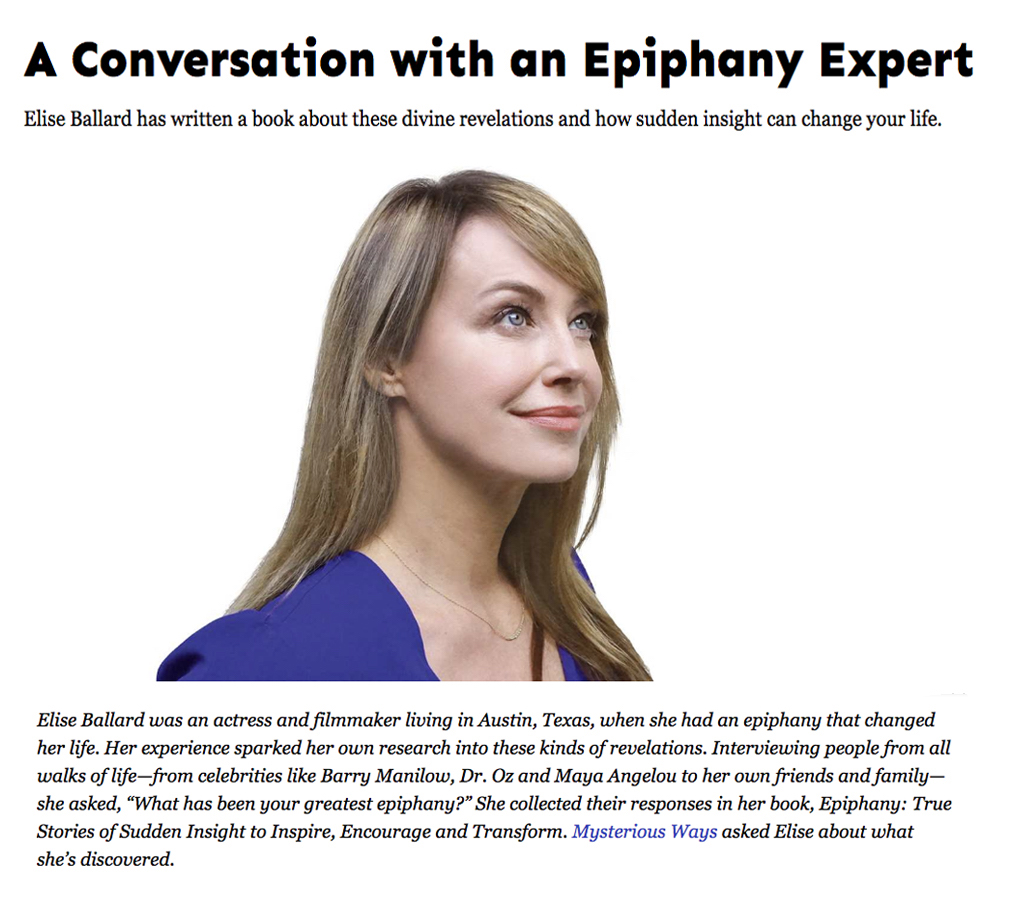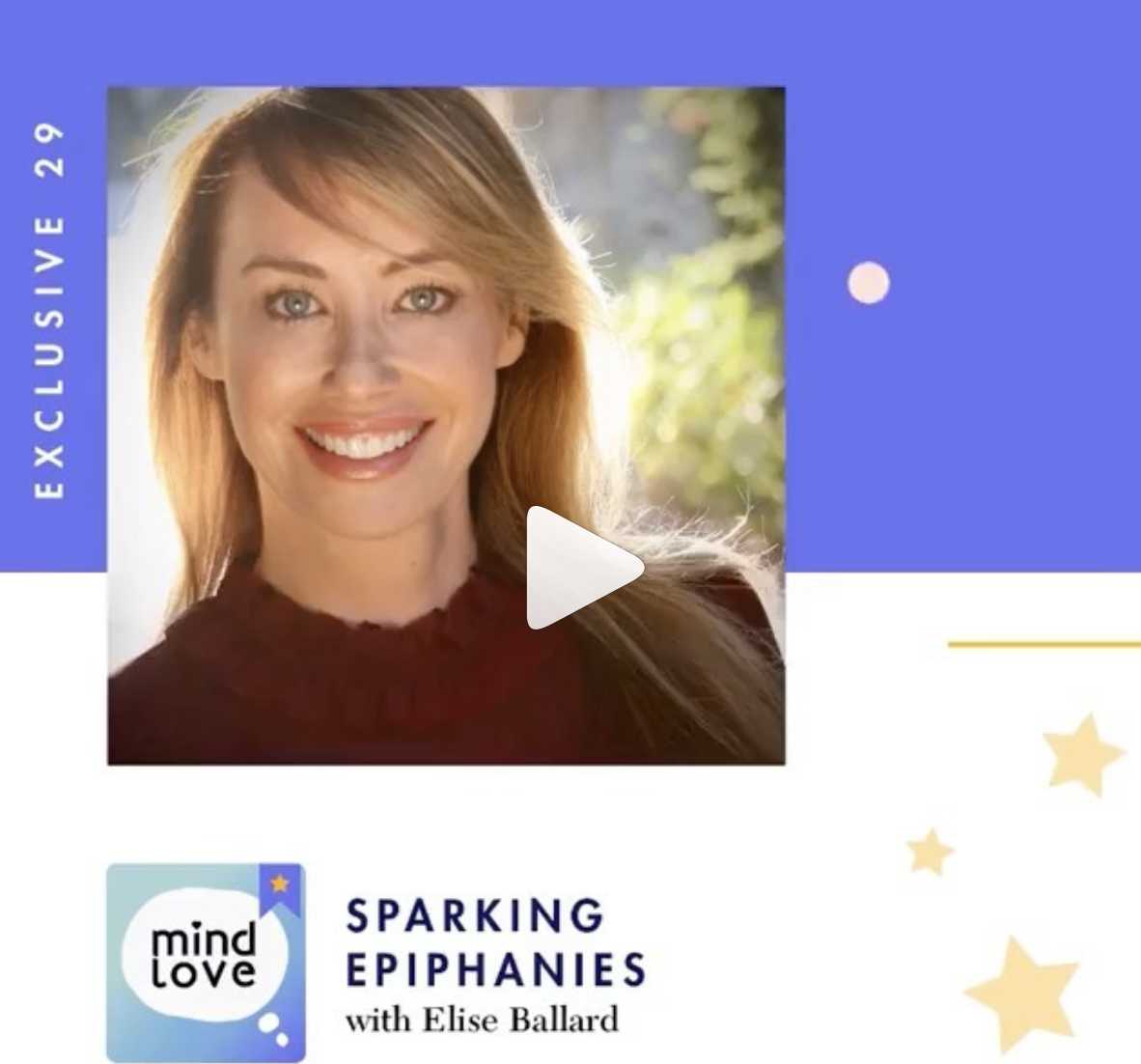
I love Guidepost Magazine’s content and mission and was honored to do this interview with Guideposts’ sister publication, Mysterious Ways. They asked me about things I talk about a lot concerning epiphanies and things I’ve never really been asked or talked about before–like my latest epiphany that happened while I was creating the Epiphany Journal.
Some of the Q&A interview is excerpted below.
****
… And that’s when you decided to write the book?
No, not then. At work, shooting behind-the-scenes footage for other productions, I started asking people, “Have you ever had an epiphany?” People’s eyes would light up. It was engrossing, watching them describe these moments. Plus, I was having more of my own epiphanies from hearing theirs! Their stories were enhancing my life. I wanted to share that with others.
The whole process leading to my writing the book was serendipitous, which is one of the classic hallmarks of an epiphany.
What are the other defining characteristics of an epiphany?
There are four elements: listening, belief, action and serendipity.
Listening is about being open. It’s about the desire to change. It’s hard to hear a message if you aren’t actively listening for one. You can open yourself up to experiencing one through practicing prayer, meditation and mindfulness. Also, pay attention to what the people around you are saying, to your own inner voice, to the things you read and to experiences you feel drawn to. You’ll know it when you hear it. When people have a true epiphany, it stands out and feels special. They believe it. That’s why belief is another hallmark. All the people I’ve spoken with have never doubted their epiphany and what it meant to them.
Of course, epiphanies aren’t truly transformative without the third step, action. Every person who had a life-changing epiphany had to take action to set everything in motion. Even if you don’t know where you’re going, you have to take that first step.
And finally there’s serendipity. That’s when the second step is revealed. And the third step. And the fourth. It’s a miraculous and fun process. Circumstances just fall into place, and it means, “Yes, this is right for you. Keep going.”
In hearing hundreds of epiphany stories, were there any similarities you noticed?
I realized that we all have these moments. No matter who you are, no matter where you live, no matter how old you are or what you believe—this is part of being human. Each story was so very different. And yet, when you boiled them down—asking what is learned—they were universal truths: belief in yourself, faith, everyday wisdom, love, growth and healing. Things that connect us all.
In your book, you say that epiphanies often have a “ripple effect.” What do you mean by that?
We don’t realize the effect we’re having. Your actions and ways of being are affecting everyone around you. As G.W. Bailey said in his interview with me, “When one life changes, many lives are changed.” Epiphanies are transformative and compel us to take positive action, and we’re interconnected beings.
Is there a difference between a miracle and an epiphany?
By definition, a miracle is an occurrence that’s inexplicable by natural law. Epiphanies don’t often go against natural law. Sometimes people have miraculous, Paul-on-the-road-to-Damascus-style epiphanies, but oftentimes, it’s the subtle ones that cause the most dramatic changes. The similarity between epiphanies and miracles is that both usually happen in moments of crisis when we need them most. And, like miracles, epiphanies are wondrous. This is because they set off such a profound shift in thinking. For so long, we don’t have clarity, and then everything changes in a moment. That’s why people often describe epiphanies as miracles.
Are epiphanies always a positive experience?
I’ve never heard of one that had a negative outcome. I think of epiphanies as fundamental truths. Even if they are painful, they lead you to your best self. If you act on them, that is. Some people don’t. I’ve spoken with people who had epiphanies but didn’t act on them. Maybe they were scared or felt it wasn’t the right time. Whatever the reason, they let these moments pass them by. But in those cases, the message often taps them on the shoulder again. And then it might hit them over the head.
Some people have asked me if it’s too late to act. Never. We can always change, grow and take action, no matter what. Our greater potential is always there, waiting for us.
What most surprised you about your research?
When you open yourself up to epiphanies, you have more of them. And what I’ve found with people who have had multiple, life-altering epiphanies is that there seems to be a theme. I interviewed one person who had multiple epiphanies about responsibility. In his case, it was about realizing he was an adult and needed to act like one and “step up” at different stages in his life.
In my own life, I’ve noticed that when I’m frightened of something, I’m often in denial. Now when I feel stuck in life, I’m like, “Elise, what are you scared of? What are you in denial about?”
I’m a spiritual person. But in doing this project, I interviewed people who had such unshakable faith that it made me question the depth of my own belief. (This happened more recently when I was creating Epiphany: The Journal last year.)
I knew there had been moments in my life when God was there. But that deep, everyday faith? I didn’t really have it. So I started working on it.
I realized that in order to deepen your faith, you have to first believe in yourself. Divine love—God’s love—is unconditional. Our goal is to be able to love like that. But you aren’t able to do that unless you have learned to love yourself unconditionally, which I really didn’t understand. Now I do.
I haven’t gotten there yet. I’m still working on it, but I’m closer now than I used to be. Thanks in no small part to an epiphany of my own and the series of good events it set into motion.
****
To read the entire interview, CLICK HERE.









